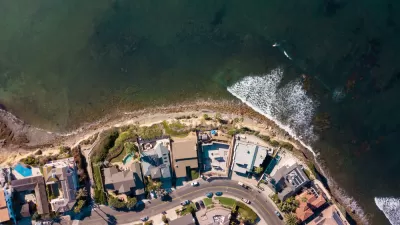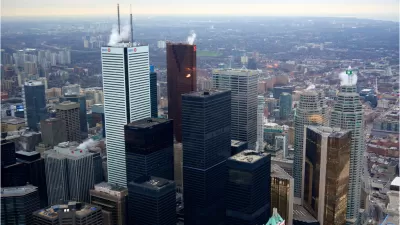A proposal from the provincial government of Ontario would revive an appeals process for planning and development processes in Toronto. An elected official and former planner writes to oppose the idea.

Brad Bradford, current Toronto city councilor and former urban planner, pens an opinion piece for Spacing Toronto that calls for a less political planning process.
"We all know planning in Toronto can be improved," writes Bradford. "Having worked in the City Planning department, I also know the path to better planning is through better politics."
Bradford admits a pro-development agenda in making this appeal, while pointing to specific policies in the city that prevent desired planning outcomes.
Outdated systems like Toronto’s site-by-site community benefits for density bonuses (Section 37 benefits) and certain politicians riding NIMBY sentiment into office have left us stuck with out-of-date zoning, and a strong aversion to change.
Zoning isn’t glamorous but bad rules have left Toronto with too few shelter locations, a misallocated housing stock with around 2 million unused bedrooms, and an oversupply of low density buildings surrounding our major transit corridors.
The op-ed includes a detailed list of prescriptions for change, but one big idea looms over the entire discussion: a proposal by Ontario Premier Doug Ford to revive the Ontario Municipal Board with a new name, the Local Planning Appeal Tribunal. News coverage by Jennifer Pagliaro provides details of that proposal, and reports on the initial political response to the idea.
FULL STORY: OP-ED: Toronto’s planning needs less politics, not more

Alabama: Trump Terminates Settlements for Black Communities Harmed By Raw Sewage
Trump deemed the landmark civil rights agreement “illegal DEI and environmental justice policy.”

Planetizen Federal Action Tracker
A weekly monitor of how Trump’s orders and actions are impacting planners and planning in America.

How Atlanta Built 7,000 Housing Units in 3 Years
The city’s comprehensive, neighborhood-focused housing strategy focuses on identifying properties and land that can be repurposed for housing and encouraging development in underserved neighborhoods.

In Both Crashes and Crime, Public Transportation is Far Safer than Driving
Contrary to popular assumptions, public transportation has far lower crash and crime rates than automobile travel. For safer communities, improve and encourage transit travel.

Report: Zoning Reforms Should Complement Nashville’s Ambitious Transit Plan
Without reform, restrictive zoning codes will limit the impact of the city’s planned transit expansion and could exclude some of the residents who depend on transit the most.

Judge Orders Release of Frozen IRA, IIJA Funding
The decision is a victory for environmental groups who charged that freezing funds for critical infrastructure and disaster response programs caused “real and irreparable harm” to communities.
Urban Design for Planners 1: Software Tools
This six-course series explores essential urban design concepts using open source software and equips planners with the tools they need to participate fully in the urban design process.
Planning for Universal Design
Learn the tools for implementing Universal Design in planning regulations.
Caltrans
Smith Gee Studio
Institute for Housing and Urban Development Studies (IHS)
City of Grandview
Harvard GSD Executive Education
Toledo-Lucas County Plan Commissions
Salt Lake City
NYU Wagner Graduate School of Public Service





























